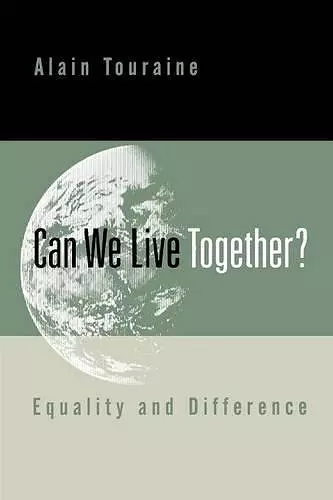Can We Live Together?
Equality and Difference
Format:Paperback
Publisher:John Wiley and Sons Ltd
Currently unavailable, and unfortunately no date known when it will be back
This paperback is available in another edition too:
- Hardback£60.00(9780745622118)

In this provocative and timely new book, Alain Touraine explores the question of how we might live together in a truly globalized world society. Rejecting the seductive metaphor of a global melting pot, Touraine mounts a powerful attack on the idea that we now live together as equals, sharing the same social and cultural values. If anything, he argues, our differences are being heightened, as communities increasingly define their identities against the encroaching forces of globalization.
Touraine argues that the twin processes of globalization and particularization are pushing us further and further apart. On the one hand, traditional values and forms of cultural expression are being eroded by homogenized mass culture. On the other, communities are becoming more introverted as they fight to defend themselves from outside influences. Even the cities where our global networks originate and are controlled are made up of communities which are foreign to one another, as they defend their identities from the tokens of mass culture.
How do we avoid a global conflict between those who control the international networks of information, and those who feel threatened by them? The first part of Touraine's book asserts that the only way to prevent the destruction of identity is for individuals to develop a personal life-project, which he calls the 'Subject'. To become a subject, the individual constructs itself as an actor, forming a stable point of reference in a world of permanent and uncontrollable change. In the second part of the book, Touraine examines how this apparently non-social principle might be used to reconstruct social life. The first step is to recognize that others are also subjects, striving for a sense of personal freedom. Touraine then argues for a replacement of the old idea of democracy, defined as participation in the general will, with the new idea of institutions that safeguard the freedom of the subject and permit communication between subjects. This is the only approach that will allow us to live together, equal and different.
This book will be of great interest to second- and third-year undergraduates and graduate students of sociology and politics.
'Touraine re-poses the issue of social solidarity which was so central to social thought at the end of the nineteenth century, setting it against the background of late twentieth-century globalization, the transformation of human societies and subjects and the displacement of many of the structures which previously gave them some stability. The book should be an important reference point for social and political theory in the new century.' William Outhwaite, School of European Studies, University of Sussex
ISBN: 9780745622125
Dimensions: 229mm x 155mm x 26mm
Weight: 482g
336 pages